Getting your period for the first time can be confusing for any girl never mind one who is Autistic or has Sensory Processing Disorder. With sensory integration problems it may take longer to absorb the physical and emotional changes in the body, which can usually happen anywhere between the ages of 9 and 16 years old, so it is best to start the discussion early – possibly with the use of social stories and visual aids. You could also use PEC’s on a keyring as a visual reminder.
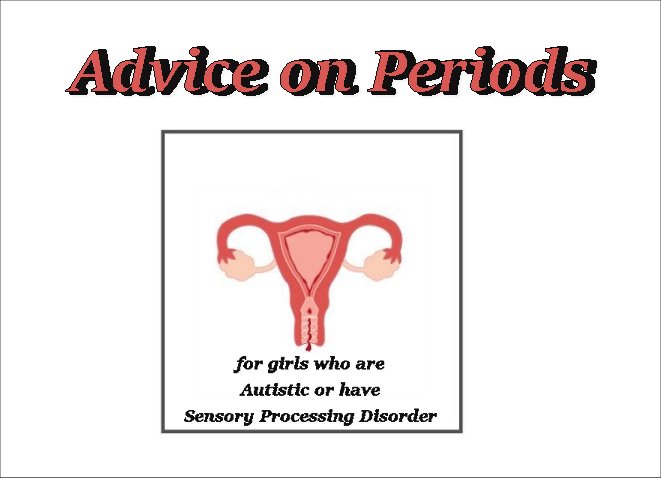
Problems with Periods for Autistic Females or those who have Sensory Processing Disorder
Communication and Emotions
As well as difficulties processing all the changes those who are Autistic or have Sensory Issue many struggle with communicating. This can be a difficult time especially if she finds it hard to regulate her hormones. A good way to help with this is to discuss what a period is and why we have them – this may start with an introduction in a physical way of this extra hole that they may not have noticed before, as it hasn’t been relevant.
Talk about the menstrual cycle, explaining that it happens to all women. Plot on a calendar the different stages (menstruating/ovulation) this will help her to keep track of when her period is due. Make sure you include the fact that they may have increased discharge on the lead up to their periods, and then on days in-between periods. Not only talk about how long the average length of a period will last each month, how much blood may be lost, and also how long she is likely to have periods in her life. It may seem strange to introduce the menopause before the first period but it might help them to have an idea of the time frame that this will happen over.
Talk about the different types of sanitary products and demonstrate how to use those them (like where to put the towel in a pair of knickers). Talk about how many of each type they might need (like only one cup or x amount of pads a day). Some disposable pads have arrows on them so this may help you decide on a preferable brand. You may or may not want to show her what used sanitary protection looks like – as not to shock her (but explain that people do not usually go around showing this!). Alternatively you could use food colouring. Either way explain that there may be blood clots – or that the blood can be either red or brown. They also need to be aware that blood slows down in water (so it is okay to get into the bath) but that when they get out it may come back suddenly so they may need a sanitary product straight away. Also that tampons can be worn in water (if they want to go swimming for example) but may change how they feel (heavy) and need changing when they get out too. Explain that the flow of blood changes too so there might be more or less at different times – throughout the cycle and throughout the day/night – with more coming at night so extra protection may be required.
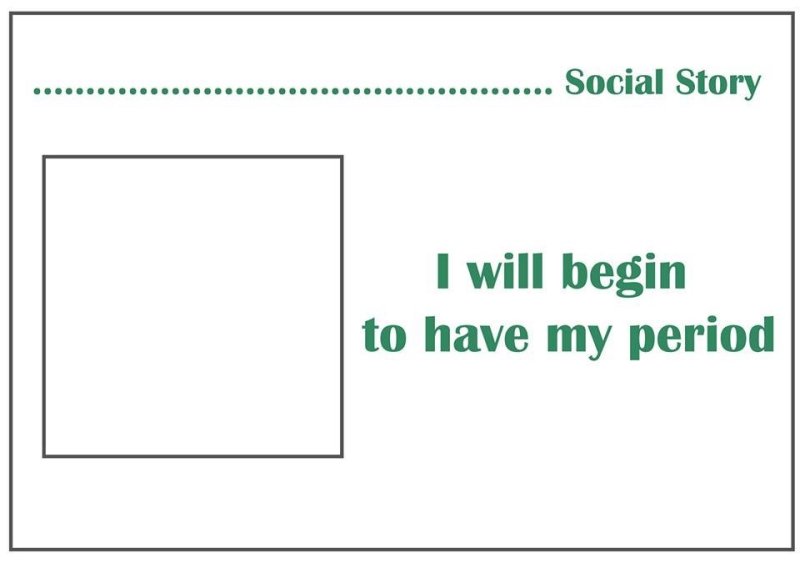
Once she has had her first period you could get her to write a diary to help identify how she feels at various parts of each month – warning her previously what this may look or feel like. It may be that the days leading up to her period she feels more angry/upset/sad/frustrated but that this stops when her period starts. This will help her understand how things are for her because not everyone is the same – and that’s okay too.
It may be that she has trouble concentrating, feels depressed or sleepy; has sore breasts, stomach or lower back, she may be more hungry, feel bloated, need to go to the toilet more, and does not know how to express this – or realise why it is happening. If it is explained what this may be like for her, including how this may look and feel, and that these things are normal it will be less frightening for her. Such as that cramping may feel like an uncomfortable or sick tummy; there may be some tightness around the abdomen, or mild pain like a headache feels (I was told by a doctor that this was just migraine of the stomach for years on the build up to my periods). Others may describe cramping like bubble or gas. Offer her ways to deal with them – such as hot water bottles, paracetamol and even chocolate!
Throughout everything you discuss make sure she knows it is normal and just a part of growing up. You may want to explain periods as a rite of passage into adulthood – and even allow her to do something a little more grown up to compensate for them (such as having extra chocolate, having a later bedtime and so on).
Sensory Difficulties and Periods
Of course there may be new sensory difficulties which arise due to her periods. It may be that she cannot cope with the feel of discharge or blood, or the sensation of a pad in her knickers/tampon inside her. This could lead on to poor hygiene, especially if this is already a problem. You need to explore all the many types of products available (towels/tampons/menstrual cups/reusable pads/reusable knickers) to discover if there’s a particular one they are more comfortable with (you could donate surplus products that did not work out for her to a homeless charity perhaps). It may be that the different products have varying smells – therefore it may be a case that reusable pads would be the best option as you could wash them with the regular laundry detergent that they are used to. They may want to use toilet wipes or a flannel for cleaning themselves after they have been to the toilet if they cannot deal with the blood.
Explain that without using them that the blood could leak through their clothes and make them uncomfortable. That if they suffer with heavy blood loss that this could still happen and it may be an idea to carry around spare knickers and sanitary products with them. But also make them aware of how and where to buy products themselves. It may be that it is the visual sight of blood and so dark sanitary pants may be the only solution.
Together you could make a “monthlies” box for the bathroom with all the things she needs. Or order a subscription box for her.
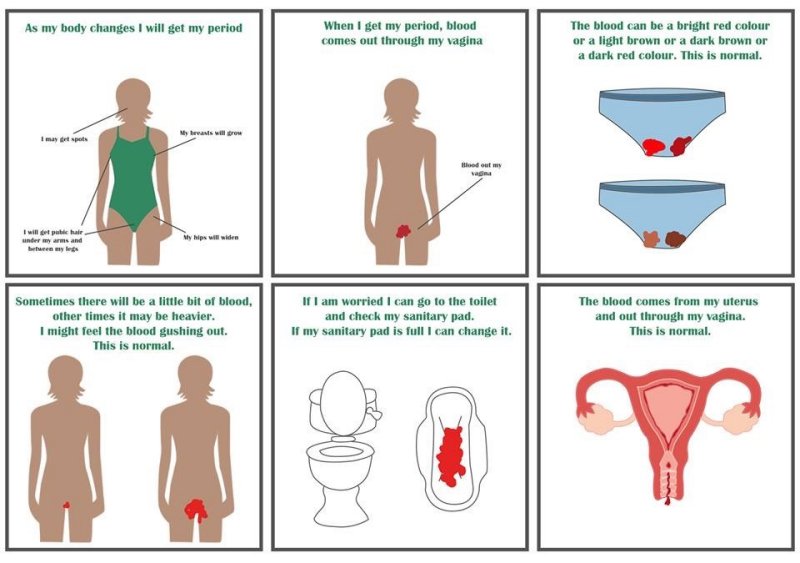
Personal Hygiene
Puberty in general is a time when personal hygiene needs addressing and it may be that they struggle with the odours that come with periods. Again which type of sanitary products they use may help with this, as well as the right kind of spray to mask the smell.
It may seem obvious but she needs to be made aware of the importance of washing her hands after changing her sanitary wear and of course they also need to know when and how to change and the correct method of disposing (including how to wrap up disposable pads and place them in the bins provided and what they can do if there aren’t any available) or cleaning their sanitary products – and that they are not flushed down the toilet. Talk about the frequency because this could be the fullness or the time – even if a pad has not got a lot of blood on it it needs changing frequently, or it will start to smell.
If reusable products are being used that they know where to put them when they have finished with them (maybe have a wet bag that they can carry around and a wet bucket in the bathroom). But be prepared that they still will hide them – you just need to make sure this situation is as least embarrassing as possible. Or maybe even teach her how to do her own washing, with her own wash hamper (obviously depending on her age) so that she does not worry what others think (and depending on her capabilities). Plus advice on rinsing them or how to treat stains.
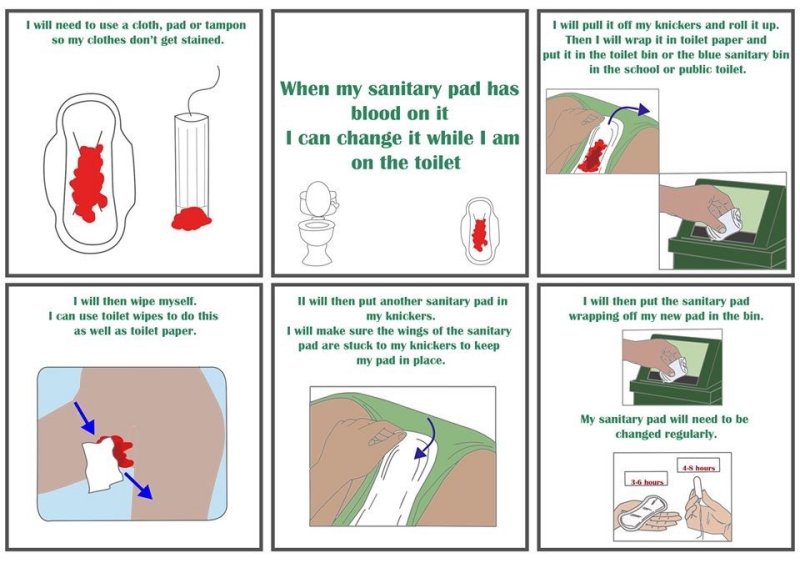
Social Rules
Obviously talking about how we take care of sanitary products after they are used are part of the social rules of our society – so you may want to explain this as a reason why as well as for hygiene reasons. But also mention about the vocabulary we use when talking about periods – plus how there is a time and place to talk about menstruation but that there are boundaries and appropriate social etiquette.
That all females have most likely had periods at some point in their lives and it is nothing to be ashamed about. A lot of us have been caught short with unexpectedly “coming on” and not had the right products to deal with it. In this case for a short while some tissue paper may help, or some toilets sell products in machines – or another female can be asked if she has anything that could be “borrowed” (this is the term used but they do not actually want it back!)
This will also include getting the attention of a member of staff if at school or college to help deal with any issues. If this may be the case it may be worth speaking to the school and see if they will help support them.
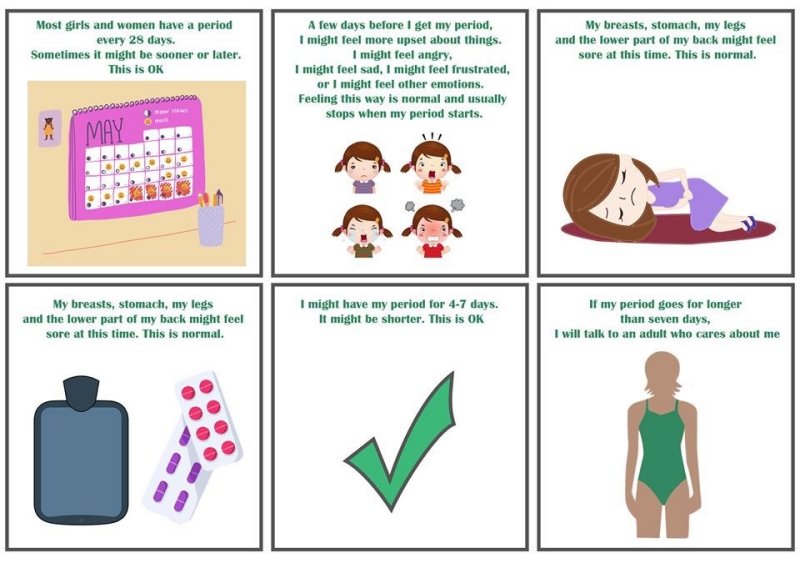
Of course if you have any further issues then do visit the GP, especially if her periods are very long in duration or heavy, or painful.
Recommended Reading and Other Resources
The Autism Friendly Guide to Periods – this has pictures which are taken over the author’s shoulder -and shows things like how to change a sanitary pad.
The American Girl Care Series
Keeping of You Series
Girls Only
Thinx (first period kit)
Social Story Images from Lil-Barb’s Delights used with permission. They were designed for a particular person with their own criteria. Some girls will be offended/upset by some of the content – or you may wish to use different products.
Thank you for everyone who helped contribute to this article, including the above recommendations.
The above is just my opinions and is not meant to substitute medical advice